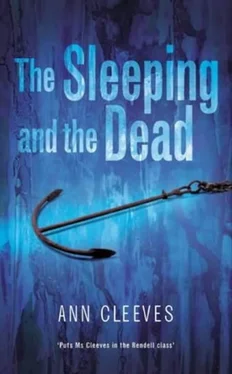They sat in Porteous’s office, which was so small that their knees almost touched, making an effort to get on.
Eddie Stout had seen Porteous cart off the boxes of files the night before and wondered what was going on. Was the man some sort of control freak? That wasn’t his job. Didn’t he trust the rest of the team? But Eddie was a Christian, a lay minister on the Methodist circuit, out every Sunday preaching to a handful of old ladies in the windswept chapels in the hills, so he had to forgive Porteous for being promoted over him and he had to make allowances. It was a strain for him, Porteous could see that. The silence between them was awkward.
Porteous liked Stout. Perhaps it would have been easier if the man had been less hospitable and generous. Why was Stout trying so hard? When Porteous had first arrived Stout had invited him to dinner at his home – an overture of friendship which had been impossible for Porteous to refuse. It had been an unexpectedly pleasant evening but Porteous felt he had disappointed Stout because he had given too little of himself away. He had taken flowers and chocolates as gifts instead of wine. Methodists didn’t drink, did they? But it seemed that nowadays they did, and after several glasses of home-brewed beer Stout had become mellow, almost Dickensian, sitting in a fat armchair, puffing his pipe, surrounded by evidence of his family. Porteous had drunk little and maintained his guard.
Stout’s wife, Bet, was plump and motherly. There were two grown-up children, settled down with babies of their own, and photographs of them were on the mantelpiece and the window-sills. Then there was Ruthie, the baby, ten years younger than the others, a wild adolescent with cropped hair, who had eaten with them, entertaining them with stories about school. Afterwards she had disappeared off to a party with her boyfriend, but not without giving her father a big hug first.
‘You’ve no family?’ Bet had asked, as if it were a loss in his life, something to be pitied, to be compensated for with comforting casseroles and sticky puddings.
He had shaken his head. ‘Never married.’
He had seen them looking at each other and had read their thoughts. At first they had considered that he might be one of them – a Christian. Perhaps of the happy clappy born-again variety, saving himself for the right girl. That might have explained his reluctance to go to the pub after work, to join in the swearing, the banter about women. But he hadn’t used the right phrases, as recognizable as a Masonic handshake. He hadn’t made himself known.
So then they had wondered if he might be gay. That too was something he was used to. It was a way for colleagues to explain his apparent celibacy, his love of art and theatre. He had heard the sniggers and the jokes, though he never responded to them. Eddie and Bet hadn’t sniggered – they were too kind and too tolerant for that. But they had felt cheated because he hadn’t been more open with them and they were curious. Later he was sure they would ask Ruthie what she thought. Porteous wondered what the answer would be.
Now, in his office, so close to Eddie that he could smell the tobacco, he had a sudden urge to explain. It would have been like talking to a priest or a shrink: ‘Ten years ago I had a nervous breakdown. Stress. Now I avoid it. You know, prevention better than cure. And I take the medication. I like my life ordered, predictable. That’s why I live alone. So I can control what goes on. It runs in the family, actually, psychiatric disorder. My dad was a nutter. He jumped off a bridge in front of the Birmingham Intercity. It’s like diabetes. Genetic.’
But it wasn’t like diabetes. Diabetes would have been no big deal; his promotion wouldn’t have been a cause for self-congratulation on the part of his superiors. ‘This shows that we take equal opportunities seriously, Peter. You’re a trailblazer. But we suggest that you don’t make a song and dance about it. You need authority, the confidence, you know, of your troops. Your past illness is no business of anyone else, is it?’
He was aware suddenly of Stout watching him, waiting for him to speak. God, he thought, it won’t take him long to work out that I’m a headcase if I sit here with my mouth open, staring into space. He pulled the three files out of his briefcase, lay them on the desk.
‘Do you remember any of these, Eddie?’
Stout read them quickly, flicking his eyes occasionally back to his boss’s face.
‘Carl Jackson. I remember that one. I was up on the hill with everyone else searching, even when I’d come off shift. It was March but the weather was foul. Low mist. Rain. I thought I’d been mad to move away from the coast.’
‘Could it be our chap in the lake?’
‘I don’t know why I didn’t think of it before.’ He seemed angry with himself.
‘So it could be him?’
‘Carl was murdered, if that’s what you mean. There’s no way he just wandered away from the track and got lost.’
‘But it doesn’t say anything here about a murder investigation.’
‘There wasn’t one. Everyone was content to put it down as an accident. According to the press, if anyone was to blame it was the social worker who suggested that he should be allowed to walk home on his own. But I talked to her in the day centre and I was impressed. She said Carl was deaf. No one had picked up how profound that disability was, and she thought he was more capable than his parents allowed him to be. In the few months since she’d known him he’d begun to read quite fluently. She thought he might catch up enough to move on to the technical college, perhaps hold down a real job. But his parents were horrified by those plans. They wanted nothing to do with them.’
‘Hard, I suppose, to stop being protective after all those years.’
‘There was more to it than that. They were a strange family.’ It was Stout’s turn to stare into space, to drag back the memories, image by image.
‘You think one of the parents was responsible for his death?’
‘Not directly. The wife, Sarah, had a younger brother. I can’t believe I can’t remember the name. He caused me enough sleepless nights at the time. He didn’t live at the farm but he’d never married and he spent a lot of time there. He was assistant manager in a hardware shop in town. It’s been closed for years but it was a big place then, dealt in agricultural supplies and machinery too. In his spare time he got involved in community work.’ He turned his head so he wasn’t looking directly at Porteous. ‘Quite a saint if you listened to Sarah. He was a scout leader in Cranford for years and ran the youth club in our church until I persuaded the committee it wasn’t such a good idea.’
‘Child abuse?’
‘Nothing proved. Never charged.’ Stout paused. ‘It was before all the child-safety legislation, don’t forget. Before Childline. Some people even treated it as a bit of a joke. If a pervy old man liked to touch young lads’ behinds when they were horsing around, so what? At least it kept the kids off the streets. And no one else wanted the responsibility of organizing the group.’
‘What put you on to him?’
‘Rumours. Some of the things the kids said. The fact that he was such a loner. He never liked working with other adults. If he had an assistant it was an older lad who’d gone through the group. I had just enough to persuade my church to drop him. Tactfully of course, with a letter of thanks and a ten-quid book token. But not enough to take it further.’
‘Until Carl Jackson disappeared.’
‘Even then it wasn’t a central line of investigation. I was a young DC. New to the district. No connections. I passed on the rumours and some enquiries were made but it seemed that the bloke had an alibi for the time Carl disappeared.’ Porteous waited for Stout to continue but he was frowning, preoccupied. ‘I’ve just remembered his name. It was Reeves. Alec Reeves.’
Читать дальше












